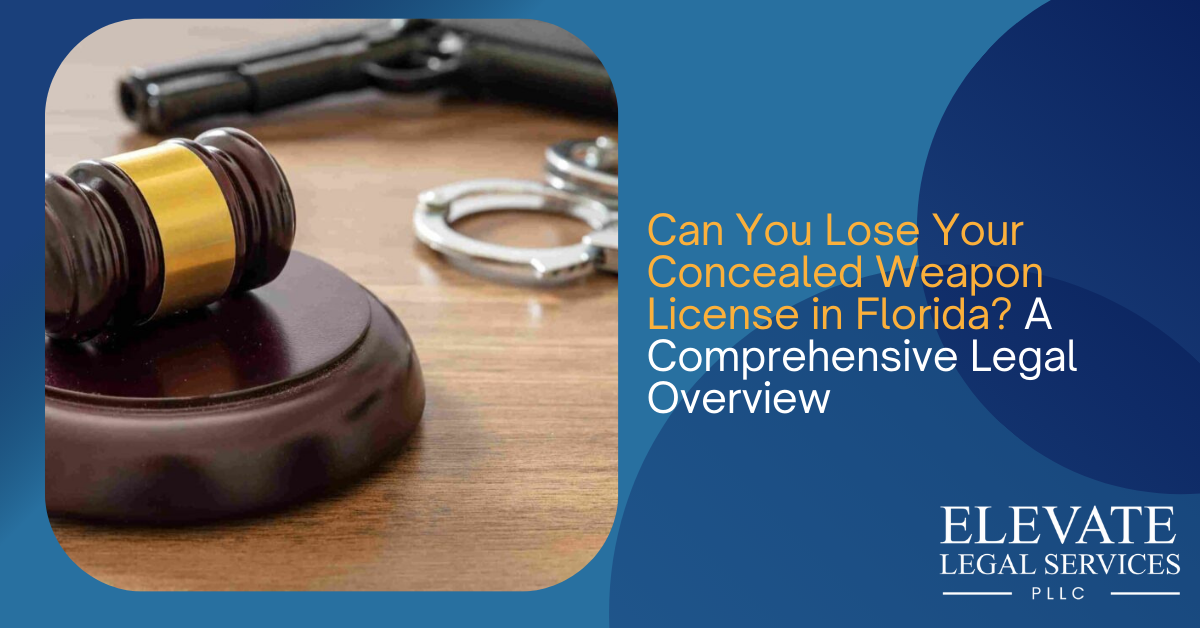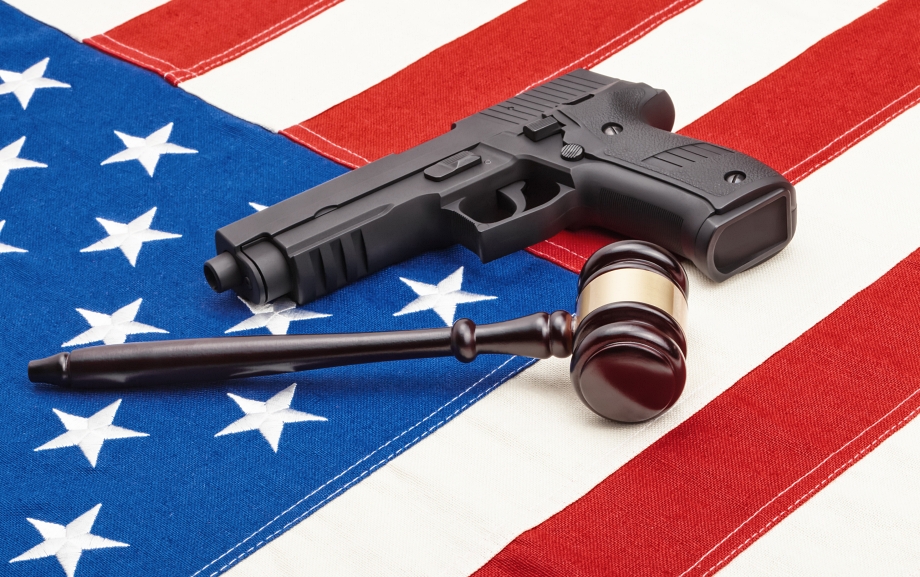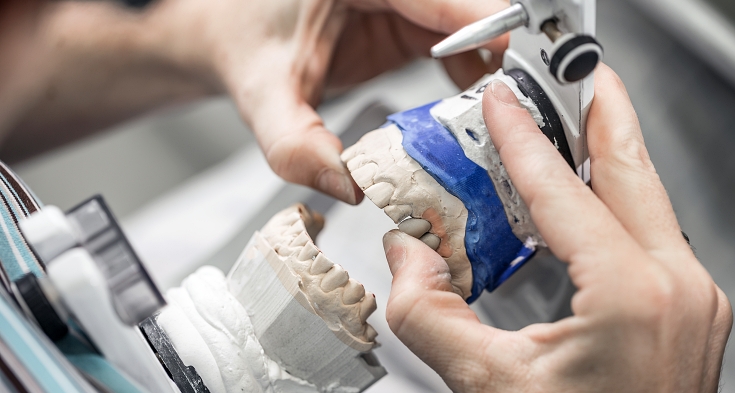
In Florida, carrying a concealed weapon is a privilege granted to those who meet specific legal criteria and comply with the regulations set forth by the Florida Department of Agriculture and Consumer Services (FDACS). However, this privilege can be revoked or suspended for various reasons. Understanding the circumstances that could lead to losing your concealed weapon license is essential for all permit holders who wish to stay compliant and protect their rights.
If you’re facing a suspension or revocation of your concealed weapon license due to an FDACS violation, the experienced attorneys at Elevate Legal Services, PLLC, can provide the guidance you need. Call us at 561-770-3335 or email [email protected] to discuss your case.
Legal Grounds For Losing A Concealed Weapon License In Florida
Several situations can lead to the suspension or revocation of a concealed weapon license. These include violations of state and federal laws, non-compliance with FDACS regulations, and personal circumstances that may compromise your ability to responsibly carry a firearm.
1. Criminal Convictions
 Criminal convictions are one of the most common reasons for losing a concealed weapon license. Under Florida Statutes Chapter 790.06, individuals with felony convictions, domestic violence offenses, or certain drug-related charges are prohibited from holding a concealed carry permit. Even misdemeanor convictions involving violence or misuse of a firearm can trigger suspension or revocation.
Criminal convictions are one of the most common reasons for losing a concealed weapon license. Under Florida Statutes Chapter 790.06, individuals with felony convictions, domestic violence offenses, or certain drug-related charges are prohibited from holding a concealed carry permit. Even misdemeanor convictions involving violence or misuse of a firearm can trigger suspension or revocation.
Key Points:
- Felony convictions lead to automatic ineligibility.
- Domestic violence or drug-related charges, even without a conviction, can result in FDACS action.
- Arrests for violent crimes or misconduct with a firearm can prompt a review.
2. Domestic Violence And Restraining Orders
Under both state and federal law, individuals subject to domestic violence injunctions or restraining orders are prohibited from carrying a concealed weapon. The Lautenberg Amendment to the Gun Control Act prohibits individuals with domestic violence convictions from possessing firearms.
Consequences:
- Immediate suspension or revocation of the license.
- Any involvement in domestic violence incidents, even if charges are later dropped, can result in FDACS action.
3. Substance Abuse Issues
Florida law mandates that concealed weapon permit holders must not engage in habitual substance abuse. Repeated DUI convictions or arrests related to controlled substances are considered risks to public safety.
Risk Factors:
- Substance dependency can impair judgment and increase the likelihood of irresponsible firearm use.
- FDACS can suspend a license if there’s evidence of ongoing substance abuse.
4. Mental Health Concerns
Mental health is another significant factor. Individuals who have been involuntarily committed to a mental health facility, particularly under the Baker Act, may have their licenses suspended or revoked.
Criteria:
- Involuntary mental health evaluations.
- History of behavior is deemed dangerous to self or others.
5. Carrying In Restricted Areas
Florida law outlines specific areas where firearms are prohibited, even for license holders. These include:
- Schools and school grounds.
- Government buildings.
- Courthouses.
- Establishments primarily serving alcohol.
Violating these restrictions can lead to immediate administrative complaints and license suspension or revocation.
The FDACS Complaint And Administrative Hearing Process
When FDACS identifies a potential violation, the complaint process involves several steps:
1. Notice Of Investigation
FDACS initiates the process by sending a Notice of Investigation, outlining the allegations, and starting the review.
Action: Respond promptly and accurately. Seek legal advice immediately.
2. Response To Allegations
Permit holders can respond to the allegations, presenting evidence to refute the claims.
Tip: Legal representation is crucial to ensure your response is comprehensive and protects your rights.
3. Administrative Hearing
If the complaint proceeds, an Administrative Hearing is held. Both sides present evidence, and an Administrative Law Judge (ALJ) issues a Proposed Order.
Outcome: This order can lead to license suspension, revocation, or other penalties.
4. Final Order And Potential Penalties
FDACS reviews the ALJ’s Proposed Order and issues a Final Order. Possible outcomes include:
- Suspension or revocation of the license.
- Financial penalties.
- Probationary conditions.
Protecting Your Concealed Weapon License
If you are about to lose your concealed weapon license, it can have significant consequences, impacting your personal and professional life. To protect your license:
- Stay informed about state and federal firearm regulations.
- Conduct yourself responsibly in all matters related to firearm handling and personal behavior.
- Seek prompt legal assistance if you face an FDACS complaint.
How Elevate Legal Services, PLLC Can Help
At Elevate Legal Services, PLLC, we have extensive experience handling FDACS complaints and administrative hearings. Our attorneys are dedicated to defending clients and safeguarding their rights.
Our Services Include:
- Crafting a robust defense against allegations.
- Representing you during administrative hearings.
- Navigating the appeals process if necessary.
Contact us today at 561-770-3335 or email [email protected] to schedule a consultation. Don’t navigate this process alone—our team is here to provide the expert legal support you need to protect your concealed weapon license.
Conclusion
In Florida, carrying concealed weapons is a responsibility that requires strict adherence to state and federal laws. Violations can lead to serious consequences, including the loss of your license. Whether due to criminal convictions, domestic violence issues, substance abuse, or mental health concerns, prompt action, and proper legal representation are key to addressing any allegations effectively.
Elevate Legal Services, PLLC is committed to guiding you through the FDACS complaint process and ensuring your rights are protected. Contact us today for professional legal support and to safeguard your concealed weapon license at 561-770-3335 or email [email protected].





